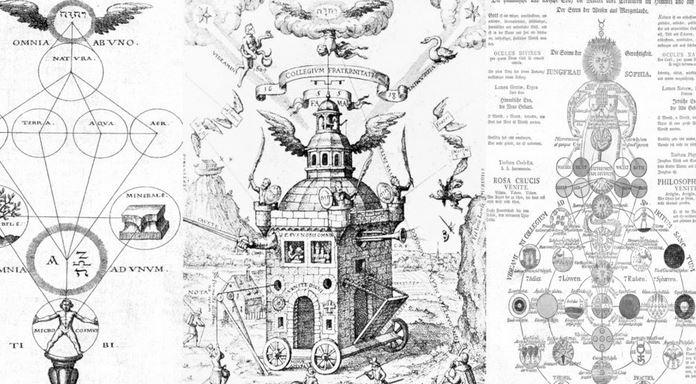Rosicrucians

The Rosenkreuzer (or Rosicrucians) are members of a mystical and esoteric organization that originated in the early 17th century, known as the Rosicrucian Order. This group is associated with spiritual and philosophical teachings, focusing on the development of knowledge, enlightenment, and mystical practices. The name "Rosicrucian" itself is derived from the Rose Cross symbol (a rose on a cross), which is central to their teachings.
Origins of the Rosicrucians
The Rosicrucians came to prominence with the publication of three manifestos in the early 1600s:
-
The Fama Fraternitatis (1614) – This manifesto introduced the Rosicrucian Order to the public and outlined the group's goals of spiritual and scientific enlightenment, promoting healing, and the pursuit of knowledge.
-
The Confessio Fraternitatis (1615) – This further explained the Rosicrucians' spiritual ideas and emphasized the importance of secrecy and discretion in their work.
-
The Chymical Wedding of Christian Rosenkreutz (1617) – A symbolic and allegorical work that illustrated the mystical journey of the initiate.
The name "Christian Rosenkreutz" is associated with a legendary figure who supposedly founded the order in the 15th century. According to the stories, he was a German mystic who traveled to the East, acquired mystical knowledge, and founded the Rosicrucian Order after returning to Europe.
Core Beliefs and Teachings
The Rosicrucians are known for blending various mystical, philosophical, and religious traditions. Some key themes of Rosicrucianism include:
-
Alchemy and Esoteric Sciences:
Alchemy plays a central role in Rosicrucian teachings, not only in the sense of physical transmutation (like turning lead into gold) but also in the transformation of the self. Alchemy represents the purification of the soul, inner knowledge, and spiritual enlightenment. Rosicrucians are also interested in other esoteric sciences like astrology, numerology, and sacred geometry. -
Spiritual Enlightenment:
The Rosicrucians believe in achieving enlightenment and self-realization through study, meditation, and inner transformation. Their teachings encourage individuals to seek higher knowledge and spiritual wisdom that transcends conventional understanding. -
Healing and Medicine:
In their early writings, the Rosicrucians also emphasized the importance of healing and the medical arts. They advocated for combining spiritual insight with scientific knowledge to achieve physical and emotional healing. The idea of healing was deeply connected to the idea of spiritual purity and balance. -
The Mystical Journey and Initiation:
Becoming a Rosicrucian is seen as an initiation process where the individual undergoes various stages of inner development and spiritual growth. The allegorical tale of Christian Rosenkreutz in The Chymical Wedding reflects this journey of self-transformation. -
Universal Brotherhood:
The Rosicrucians often saw themselves as part of a global brotherhood, a community of like-minded individuals who work toward the betterment of humanity. Their ideal was a world in which individuals, through spiritual awakening, would help to bring about a new era of peace, knowledge, and understanding. -
The Role of Symbolism:
Symbolism is key to Rosicrucian philosophy. The Rose Cross symbol, for example, represents the union of the physical and spiritual realms. The rose (representing spiritual wisdom) and the cross (representing physical existence and sacrifice) are combined to show the interconnectedness of the two.
Rosicrucianism and Its Influence
Rosicrucian ideas have influenced many other mystical and philosophical movements, including:
-
Freemasonry: Some elements of Freemasonry share similar symbolic themes and ideas with Rosicrucianism, such as the focus on personal transformation and the use of symbols and rituals.
-
Theosophy: The Theosophical Society, founded by Helena Blavatsky, shares many ideas with the Rosicrucian tradition, especially the emphasis on spiritual knowledge, esoteric teachings, and the quest for truth.
-
Alchemy and Hermeticism: The Rosicrucians were heavily influenced by alchemical and Hermetic traditions, which focus on the hidden wisdom of the universe and the transformation of the self.
Modern Rosicrucian Orders
There are several modern Rosicrucian organizations that claim to continue the legacy of the original Rosicrucians, although their practices and beliefs may vary. Some of the notable ones include:
-
The Ancient and Mystical Order Rosae Crucis (AMORC):
This is one of the largest modern Rosicrucian organizations, founded in the early 20th century. It focuses on esoteric knowledge, spiritual development, and personal transformation through study, meditation, and teachings. -
The Rosicrucian Fellowship:
Based in the United States, this fellowship emphasizes Christian mysticism, healing, and the study of sacred texts. -
The Lectorium Rosicrucianum:
This international Rosicrucian group focuses on spiritual enlightenment through the study of mystical Christianity, Eastern teachings, and Western esoteric traditions.
Summary
The Rosicrucians (or Rosenkreuzer) are a mystical, spiritual organization that emerged in the 17th century, with a focus on the pursuit of esoteric knowledge, personal transformation, alchemy, and healing. They have influenced many philosophical, mystical, and scientific traditions, and their ideas have persisted through various modern organizations. While their beliefs and practices vary, the central tenets of Rosicrucianism include spiritual enlightenment, self-transformation, and the use of ancient wisdom to improve the world.


